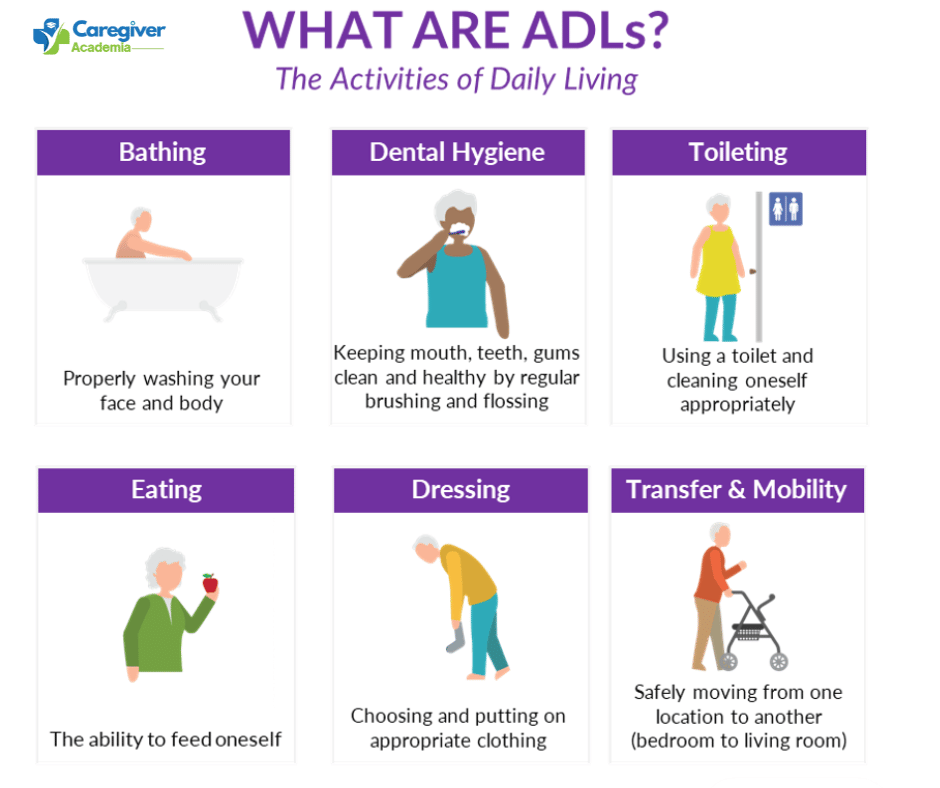What are ADLs?
The essential and routine tasks that most young, healthy individuals can perform without assistance is ADLs. ADLs are basic tasks we need to do to take care of our patients as caregivers. These include:
- Personal Hygiene and Bathing: Keeping clean and taking a bath or shower.
- Dressing and Undressing: Choosing clothes and putting them on.
- Feeding and Eating: Eating food and making sure it’s good for your patience. And be sure to follow the nutrition plan of your patient.
- Mobility and Transferring: Moving around and changing positions.
- Toileting: Using the toilet and staying clean.
Why ADLs are Important for Elder Care:
For caregivers like you, knowing about ADLs helps figure out how much help an older person needs. It helps plan the care they need in areas like personal care, moving around, and eating.
More about ADLs: Instrumental Activities
Apart from basic ADLs, there are more complex tasks called Instrumental Activities of Daily Living (IADLs). These include managing money, transportation, shopping, and housekeeping.
How to Assess ADLs
- Regular Assessment: Keep an eye on how your patience is doing with ADLs. Look for changes in health and needs.
- Professional Assessment: Get help from healthcare professionals for a more detailed understanding if needed.
Tips for Helping with ADLs
- Create a Supportive Environment: Make home tasks easier, like adding bars in bathrooms or using special utensils.
- Encourage Independence: Urge your patience to do what they can on their own. It keeps them independent and feeling good.
Caregiver’s Role in ADLs
As a caregiver, your job is essential. You provide physical help and emotional support. Knowing what your patience can and can’t do is crucial for giving the best care.
ADLs and Aging: Physical and Occupational Therapy
As people get older, they might find it harder to do ADLs. Physical therapy (PT) and occupational therapy (OT) can help.
Physical Therapy (PT): Exercises to build strength, balance, and mobility.
Occupational Therapy (OT): Strategies to help with specific needs, from dressing to meal preparation.
Adaptive Equipment and Assistive Devices, Tools like grab bars, raised toilet seats, or special kitchen utensils can make ADLs safer and easier.
Importance of Independence
The goal is to help seniors be independent. Encouraging them to use their abilities boosts confidence and keeps them feeling capable.
The mantra of keeping yourself secure and fit for caregiver job:
At work, people forget about their safety but it is crucial to keep yourself safe such as while lifting if the patience is heavy then get help from someone or use a host machine (Patient Transfer Lifts) and always wear bealts to keep your back safe. And more importantly, focus on your meal plan to keep yourself healthy. So that the next day you can wake up in the fresh mood and continue your job.
Conclusion
Understanding ADLs, getting help from therapies, and using adaptive tools help seniors live independently. Your dedication to your loved one’s care is incredible. With the right knowledge, you can make this caregiving journey fulfilling for both of you.
To get pro caregiver class from our pinoneers join Caregiver Academia Class
